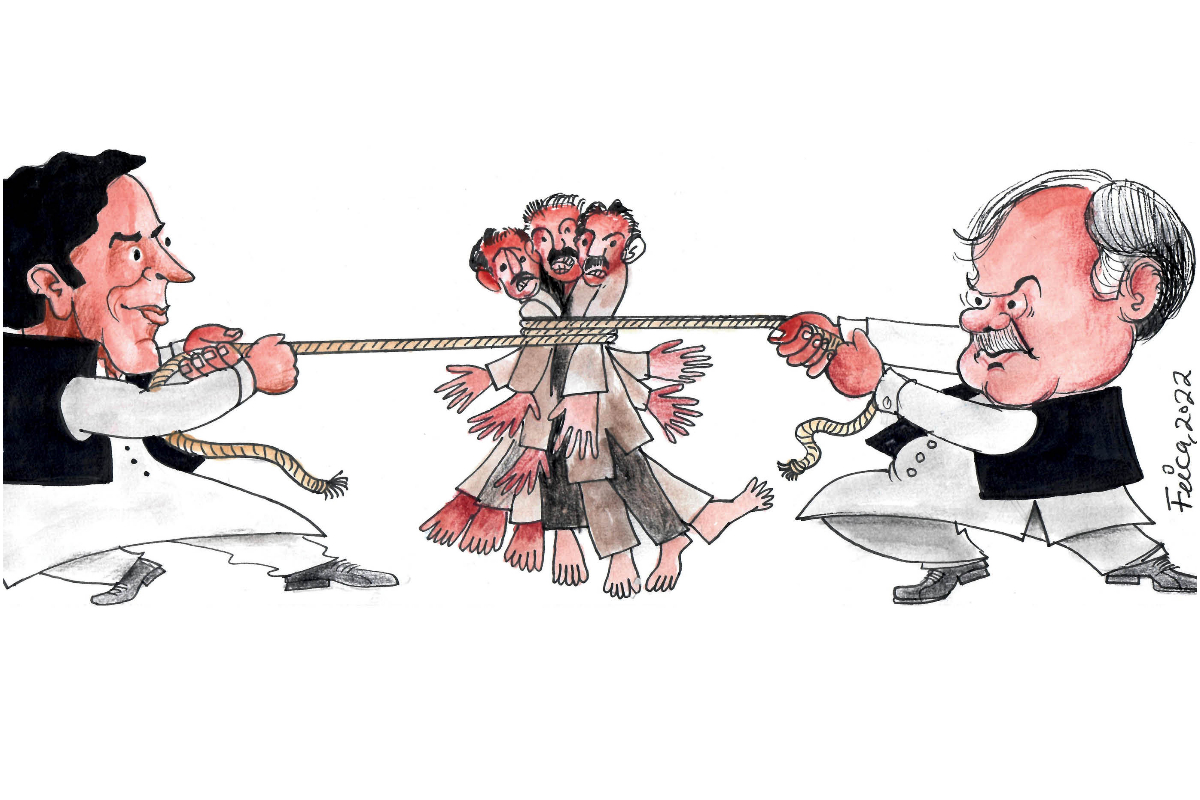
Shahbaz govt refused to pursue the Greater Thal Canal project revived by PTI
Lahore: The country’s ruling elite has once again failed the poor masses of this country; this time they are the farmers from underdeveloped smaller districts of South Punjab.
From Layyah, Bhakar, Jhang and Khushab to Muzaffargarh, farmers fell prey to the ongoing political tussle between the federal and Punjab governments. The latest on the list is the refusal of the federal government to sign the loan agreement with the Asian Development Bank (ADB) for the construction of the Greater Thal Canal. Experts call it an injustice not only to Punjab but also to the population of Pakistan.
One of the deputy directors from Punjab’s finance department told Bol News that from 2007, the project had been at a standstill until the PTI government got it approved by the executive committee of the national economic council and arranged funds for it.
He maintained that the PTI government contacted ADB for the construction of phase II and signed a financial support contract of 200 million dollars.
Agreeing with him, one of the senior officials at the irrigation department said that it was the federal government’s fault not to carry on with the project resulting in its termination, but the blame has to be shared by others too.
“Secretary Irrigation Manzoor Hussain is equally responsible for his failure in effectively presenting the case and convincing the officials. At the end of the day, it was he who would have told the officials about its significance.
The project was not okayed depriving the province of one of the game-changer projects for South Punjab,” he concluded.
Executive engineer Ajmal Khan Bharwana at the irrigation department who was looking after this project told Bol News that the final date for signing the loan agreement with the Asian Development Bank was December 13 for the rest of phase I and the construction of phase II.
“As the government has failed to sign the project with the ADB, the plan for the maintenance of phase I and construction of phase II of the Greater Thal Canal project have ended by itself,” he said disappointingly.
Agreeing with him, Asad Shafeeq an executive engineer at the irrigation department in Layyah said that had the project been signed with ADB a new age of development would have started in different districts including Layah, Bhakar, Jhang, Khushab and Muzaffargarh.
“With the completion of this project, not only one lac and seventy-five thousand acres of land would have been provided with irrigation facilities but also the annual production would have increased up to 2.25 million tonnes,” he noted.
After the completion of the Greater Thal project, the new land would have come under cultivation and coming generations of these areas would have been able to earn a respectable livelihood.
Sources from the irrigation department maintained that this project was a lifeline for the farmers of Punjab and was of immense importance because it would have helped in cultivating the Thal desert lands and increase the production of food as we require more area for cultivation to produce more food and this project would have assisted to meet nutritional needs. Agriculture irrigated by the canal system of Punjab is an important component of the country’s economic development. Agriculture accounts for 20 per cent of our GDP and 50 per cent of Punjab’s workforce is engaged in this sector. Nearly half of Punjab’s agricultural production is derived from paddy fields, which depend on the canal system.
Need to declare a water emergency
Due to its exceptional canal network, Punjab is the food bucket of Pakistan. The farmers of Punjab are ensuring food security with the help of canal water. There is a dire need of declaring a water emergency in the country so that the available water resources could be used economically to meet and fulfil the needs of the country effectively.
The chief engineer noted that the objective of the proposed loan programme is food security and economic stability in Punjab.
“The farmers of Punjab are likely to suffer greatly now as the loan signing period has expired. This will result in delays and cost overruns which will further burden provincial resources,” the chief engineer maintained.
Discrimination faced by Punjab for irrigation water
He recalled that according to the 1991 water accord, the Kachhi canal project for Balochistan and Rainee canal project for Sindh were constructed similarly the Chashma Right bank irrigation project for Khyber Pakhtunkhwa was approved while Punjab is being deprived of its rights.
The chief engineer stated that phase II under the proposed project included the Chobara canal system and phase 3 included, Dhangana, the Noorpur branch and the Mehmood Sub canal system.
“Water was allocated under the water accord of 1991, according to clauses 8 and 14D of this water accord 1991 provinces will be allowed to construct new canal systems from their water share and after the construction of the Greater Thal Canal, Punjab would have used its share and not the water of any other province,” he shared.
Executive engineer Khushab Hassan Murtajiz Khan from the irrigation department believed that all the provinces have projects regarding flood rehabilitation, while Punjab does not have a single project of this nature. In one of the meetings, Punjab answered Sindh’s objections with statistics.
Greater Thal Canal will have water from Punjab only and not from any other province, otherwise, this water falls into the sea. This is Punjab’s water. The prosperity of Punjab is dependent on the Greater Thal Canal. He apprised that Pakistan discharges 25 million acre-feet of water into the sea every year and on the other hand, by making baseless accusations, such development works are stopped and the path of development is obstructed.
However, a retired senior bureaucrat who was privy to this project told Bol News that there are two aspects to the issue. The first is the signing of an agreement with ADB. And the second is the share of the Indus water among provinces.
“As far as the signing of a foreign loan is concerned the matter falls within the purview of the federal government,” he noted.
For him, the federal government (Finance Division and the Economic Affairs Division) have to see if it has the fiscal space to absorb the foreign loan in its accounts. Many factors determine this fiscal space availability.
The retired senior bureaucrat maintained that the second issue is the distribution of the water. According to the water sharing agreement of 1991, provinces have been allocated shares.
“ISRA administers these shares. Any increase or decrease has to be with the consent of the provinces. If Punjab feels any issues with this sharing it has to take it up at ISRA’s level or take it to the IPC (Inter-provincial coordination committee),” he concluded.
Farmers’ plight
Ghulam Abbas, a farmer from Jhang told Bol News that the establishment of a completely new canal system would have increased the cultivation area of our lands, which will ultimately result in the economic growth of the country and the conditions of farmers will also improve.
“Along with this, the water coming out of the canals would also reach our land because of which it will help to settle the barren land, which will increase the food production of the country. The more barren land that is settled, the more people will be self-sufficient and help to end unemployment,” he maintained.
Agreeing with him, Abdullah Shehryar Rizvi, a farmer from Layyah said that agriculture is the backbone of Pakistan’s economy and for its improvement, it is important to provide such facilities to the farmers so that they could produce their best.
For him, water is the most important ingredient for agriculture and it consistently produces the best harvest. In this era of inflation, it is no longer possible to prepare the crop on the electric tube wells, this has increased the cost of the crop, which is why the end product gets expensive every year if the new system is strengthened and the water supply to the people is ensured besides its access is made easy, it will also help in controlling inflation eventually.
“It was a very good public project but the politicians do not get free time from arm twisting each other, their only pursuit is the chair and they do not prepare any strategy for the people. The projects which are in favour of the people are stopped due to politics,” he said.
With the Greater Thal Canal project, a large part of the desert would have been converted into the country’s agricultural land or cultivation area, which would have ended unemployment, increased livestock and provided immense employment to the people but in vain, he concluded.
Catch all the Urban Insight News, Breaking News Event and Latest News Updates on The BOL News
Download The BOL News App to get the Daily News Update & Live News.












 Read the complete story text.
Read the complete story text. Listen to audio of the story.
Listen to audio of the story.